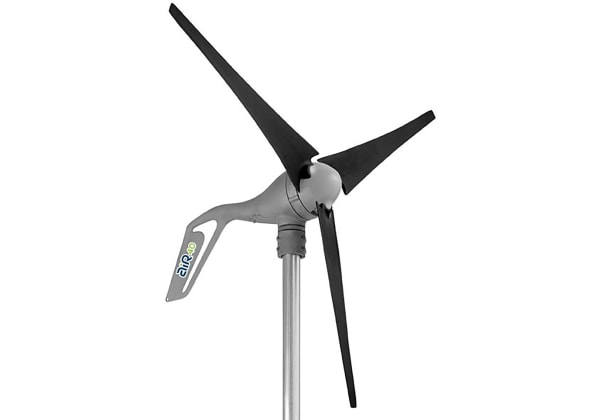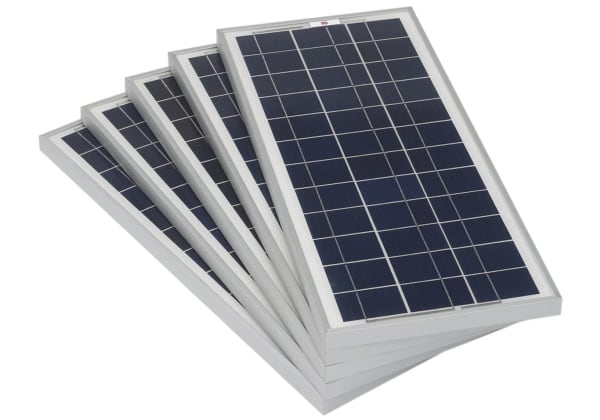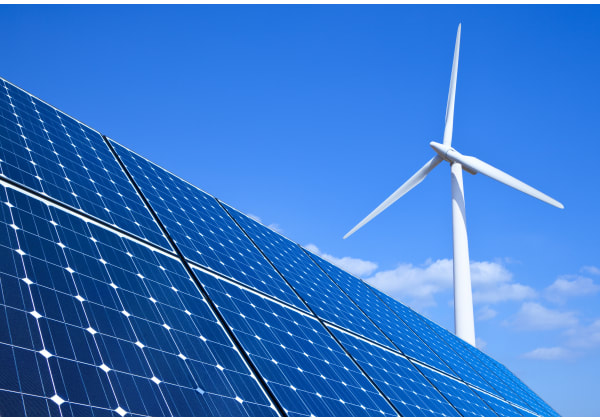- Published 22 Oct 2024
- Last Modified 7 Oct 2025
- 7 min
Energy Efficiencies of Solar Panels and Solar Cells
When solar panels are deployed in industry, they provide a cheap, clean source of electricity without emitting greenhouse gases. This guide explains why some solar panels are more efficient than others and outlines the factors to consider when developing a solar panel system.
How efficient are solar panels? It’s a key question. Solar panel efficiency determines how much electricity a solar panel installation will produce. Energy efficiency of solar cells and panels refers to how much of the sunlight that hits the surface of the panel is converted into usable electricity. Solar panel efficiency tends to range between 13% to 25% but can be as high as 40% or 50% for some high-end and experimental systems. This guide explains what solar panels and cells are, what makes them more or less efficient, and some of the different types of solar panels on the market.
What Are Solar Panels and Solar Cells?
First, let’s take a step back. What are solar panels and solar cells? Solar panels, also known as photovoltaic panels, capture the sun’s energy and convert it into electricity. They are a key form of renewable energy. Solar panels are reliant on solar cells (photovoltaic cells), which capture sunlight and generate direct current (DC) electricity, which is then converted by an inverter to alternating current (AC) for use in homes and businesses.
Solar panels are widely deployed in industry and residential settings. They provide a cheap, clean source of electricity without producing greenhouse gases. There is more than 15GW of solar energy capacity in the UK right now, much of it provided by photovoltaics. That’s out of a worldwide total of 310GW, according to the International Energy Agency.
Understanding Solar Panel Energy Efficiency
The efficiency of a solar panel determines how much electricity it will generate. When it comes to solar cells vs solar panels, it’s the individual efficiency of each solar cell that ultimately determines the overall efficiency of the solar panel. Solar panel types vary in efficiency. Monocrystalline panels enjoy greater efficiency than polycrystalline solar panels.
Scientists are working all the time to improve solar cell efficiency. In the lab, it has been possible to produce photovoltaic cells with efficiencies greater than 45%. In real-world conditions, solar panels typically have efficiencies of around 15 to 25%. Efficient solar panels require less space to produce an equivalent amount of electricity compared to solar panels that are not as efficient.
What Affects Solar Panel Energy Efficiency?
The efficiency of a solar panel is affected by numerous factors. Some solar cell types are inherently more efficient than others. Construction techniques and the materials used also have an impact on the efficiency of a solar panel. The location and orientation of solar panels affects their efficiency. For example, south-facing panels (in the northern hemisphere) will capture more sunlight and therefore be more efficient. The best solar panels are tilted. This makes them perpendicular to the sun’s rays, which also makes them more efficient.
Ironically, if panels overheat, they don’t work as well. That’s why it can be a good idea to leave space for air to circulate underneath a panel or to install white roofing, which reflects sunlight, around the panel array.
Solar panel efficiency can also be affected by panels in an array being in the shade or becoming covered with dirt or debris. In this scenario, using micro solar inverters in a solar panel system – rather than a traditional string inverter – can be useful, as micro inverters enable those individual panels that are uncovered to function normally. In general, the efficiency of the inverters used is also important in ensuring energy is not lost in the conversion of current from DC to AC.
Solar Panel Energy Efficiency Over Time
Solar panel efficiency over time degrades. Older solar panels produce less electricity than newer solar panels. Being permanently exposed to the elements, solar panels have to be pretty tough to survive. Manufacturers will guarantee performance over a certain period, but after that, users can expect a gradual deterioration of performance as the years roll by.
Accumulated dirt, dust, or snow on the panel surface can reduce light absorption, lowering efficiency. Over time, solar panels lose efficiency due to wear and environmental exposure. This degradation is usually about 0.5-1% per year, depending on the panel type. Monocrystalline panels tend to have slower degradation compared to polycrystalline panels. External factors like severe weather conditions, poor maintenance, and physical damage can also accelerate degradation.
Cell, Module, and Panel Efficiencies
There is a difference between the efficiency of individual solar cells and overall solar modules. This is because a solar cell’s efficiency considers energy hitting the individual cell, whereas the efficiency of the module considers energy hitting the entire module, which will typically include the gaps between cells. Overall performance of the panel is also affected by factors such as the electrical connections, connections between solar cells, and packaging of the unit.
Temperature, shading, angle and orientation are other factors that affect efficiency. Higher temperatures typically reduce the efficiency of solar panels, as excess heat interferes with the photovoltaic process.
Solar Panel Types
There are a variety of types of solar panel on the market, including monocrystalline and polycrystalline types. Second generation thin-film solar cells are also available, and they can be used in applications that cover a large area, such as the exterior of commercial buildings. Thin-film solar cells are lightweight and flexible and can be integrated into the building structure.
There are also what are known as concentrated photovoltaic cells, which use mirrors and lenses to channel the sun’s rays. These solar panel systems may also track the movement of the sun across the course of the day, or feature cooling systems to boost efficiency. Advantages of concentrated solar photovoltaics include the lower cost of materials such as mirrors and the ability to use fewer photovoltaic cells to generate electricity.
Monocrystalline Solar Panels
As the name suggests, monocrystalline solar panels use a high-quality slice of a single silicon crystal to form each solar cell. Monocrystalline solar cells typically have an efficiency of 15% to 20%. In addition to a relatively high efficiency, these types of solar panels can generate power using less space than some of their counterparts. They also enjoy a longer life expectancy and perform better than polycrystalline panels when there is less sunshine. But these advantages mean monocrystalline solar panels come with a higher price tag.
Polycrystalline Solar Panels
Polycrystalline solar panels are easier to make than their monocrystalline competitors. Polycrystalline solar cells, which are made from fragments of silicon, can also be manufactured quicker, and are cheaper. When considering polycrystalline vs monocrystalline solar panels, the disadvantages of polycrystalline designs are lower efficiency (between 13% and 16%) and heat tolerance, and a requirement for more space.
Thin-Film Solar Panels
Thin-film solar panels are made by coating a substrate such as glass or metal with an extremely thin layer of photovoltaic material. Materials used include cadmium-telluride, copper indium gallium selenide, amorphous silicon (silicon in non-crystalline form that is cheap but relatively inefficient when used to make solar cells), and gallium arsenide.
Thin-film solar panels may have a smaller impact on the environment in production and are suited to applications such as laminating large expanses of glass with photovoltaic material.
PERC Solar Panels
PERC (Passivated Emitter and Rear Contact) panels are types of solar panel that enhance solar panel efficiency by adding an extra reflective layer to the rear of each solar cell. This extra layer sends unused light back into the cell to be converted into electricity. PERC solar modules also reduce heat, helping to improve performance.
PERC solar panels are typically slightly more expensive than traditional solar panel types, but also feature either monocrystalline or polycrystalline construction. PERC panels tend to be more efficient and operate better in areas where it is very hot.

Selecting the Best Solar Panel
Installing solar panels has a number of benefits, including reducing the business’s carbon footprint and energy bills. Solar panels do not typically require lots of maintenance and they have a long life. These are some of the key factors to consider when choosing a solar panel while aiming for best solar panel efficiency:
- Choice of materials. Any discussion about how to increase solar panel efficiency needs to consider the material type used in the solar cell. Polycrystalline materials are cheaper and quicker to make but less efficient. Monocrystalline cells are more efficient but higher cost. Thin-film solar panels may be an option if the aim is to use the expanse of a building to create clean electricity.
- Efficiency rating. Deciding on the right panel means considering its efficiency rating – how good it is at converting sunlight into electricity. This has a bearing on the number and size of solar panels you will need to achieve a given power output. Don’t forget that the efficiency of solar panels also tends to diminish over time.
- Cost. The cost of the solar panel system will depend on the type of material used and the number of panels required. It’s also necessary to factor in the efficiency of the panel when considering cost. Will a higher upfront outlay be rewarded with more efficient electricity generation? Does taking a cheaper option mean reduced panel life?
- Installation constraints and warranties. It’s a good idea to calculate the total cost of ownership to understand the best value.
Once you’ve thought through these considerations, you’re ready to begin your solar panel journey. You can look forward to cheaper, renewable energy – and be secure in the knowledge that you’re helping battle climate change.
Looking to install solar panels? Check out RS’ range of solar panel mounts.



